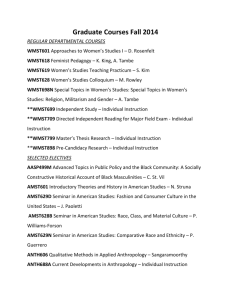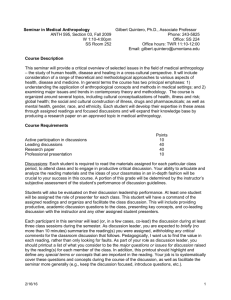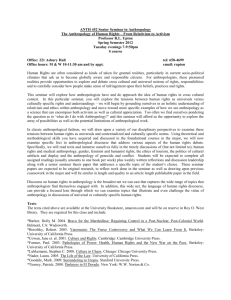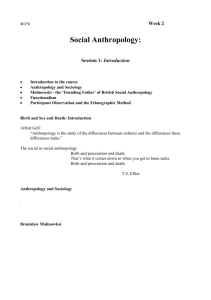FRS3015 Legal Anthropology 4 Credits
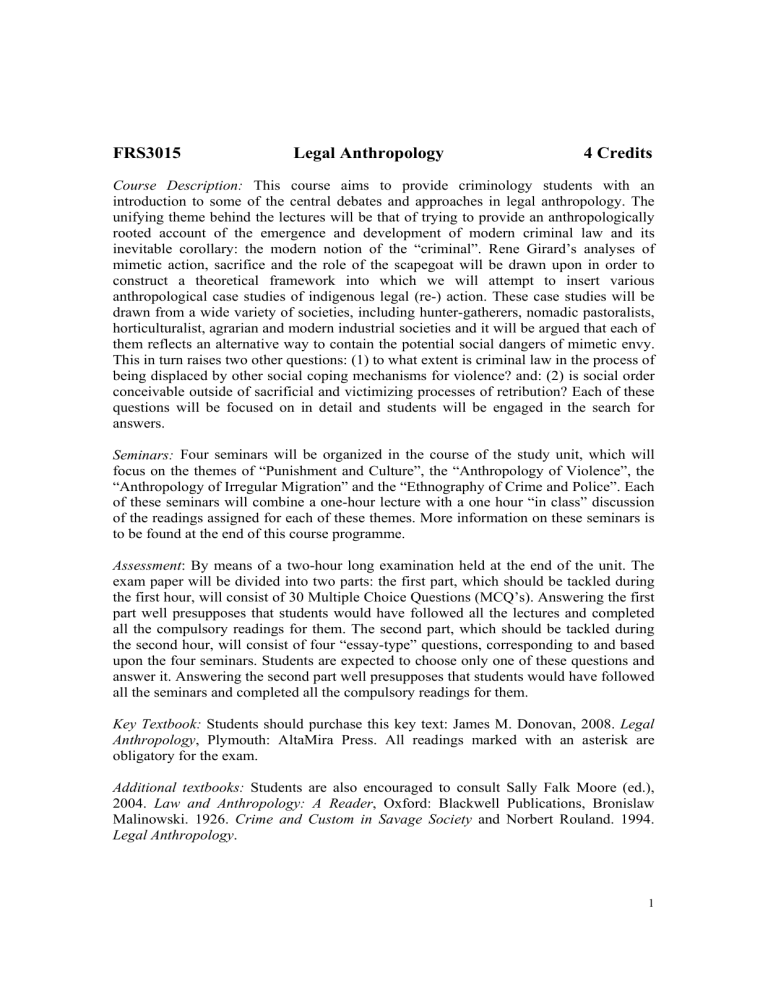
FRS3015 Legal
Course Description: This course aims to provide criminology students with an introduction to some of the central debates and approaches in legal anthropology. The unifying theme behind the lectures will be that of trying to provide an anthropologically rooted account of the emergence and development of modern criminal law and its inevitable corollary: the modern notion of the “criminal”. Rene Girard’s analyses of mimetic action, sacrifice and the role of the scapegoat will be drawn upon in order to construct a theoretical framework into which we will attempt to insert various anthropological case studies of indigenous legal (re-) action. These case studies will be drawn from a wide variety of societies, including hunter-gatherers, nomadic pastoralists, horticulturalist, agrarian and modern industrial societies and it will be argued that each of them reflects an alternative way to contain the potential social dangers of mimetic envy.
This in turn raises two other questions: (1) to what extent is criminal law in the process of being displaced by other social coping mechanisms for violence? and: (2) is social order conceivable outside of sacrificial and victimizing processes of retribution? Each of these questions will be focused on in detail and students will be engaged in the search for answers.
Seminars: Four seminars will be organized in the course of the study unit, which will focus on the themes of “Punishment and Culture”, the “Anthropology of Violence”, the
“Anthropology of Irregular Migration” and the “Ethnography of Crime and Police”. Each of these seminars will combine a one-hour lecture with a one hour “in class” discussion of the readings assigned for each of these themes. More information on these seminars is to be found at the end of this course programme.
Assessment : By means of a two-hour long examination held at the end of the unit. The exam paper will be divided into two parts: the first part, which should be tackled during the first hour, will consist of 30 Multiple Choice Questions (MCQ’s). Answering the first part well presupposes that students would have followed all the lectures and completed all the compulsory readings for them. The second part, which should be tackled during the second hour, will consist of four “essay-type” questions, corresponding to and based upon the four seminars. Students are expected to choose only one of these questions and answer it. Answering the second part well presupposes that students would have followed all the seminars and completed all the compulsory readings for them.
Key Textbook: Students should purchase this key text: James M. Donovan, 2008. Legal
Anthropology , Plymouth: AltaMira Press. All readings marked with an asterisk are obligatory for the exam.
Additional textbooks: Students are also encouraged to consult Sally Falk Moore (ed.),
2004. Law and Anthropology: A Reader , Oxford: Blackwell Publications, Bronislaw
Malinowski. 1926. Crime and Custom in Savage Society and Norbert Rouland. 1994.
Legal Anthropology .
1
Course Programme
Week 1 Key concepts: Culture, Society and the scope of Social
Anthropology; What is Law? Why study Legal Anthropology?
Readings:
Donovan, James 2008. Legal Anthropology , pp.1-26*
Keesing, Roger & Andrew Strathern, 1998. Cultural Anthropology , Harcourt Pub., pp.288-301*
Falk-Moore, Sally 2004. Law and Anthropology: A Reader , (ed.), pp.12-17
Watch: Extract from BBC Documentary “Tales from the Jungle – Malinowski” on: http://www.youtube.com/watch?v=N-sBtFJMNrA&feature=related
Week 2 Sociology of Law I: Marx & Weber
Readings:
Donovan, James 2008. Legal Anthropology , pp27-55*
Week 3 Sociology of Law II: Durkheim & Maine
Readings :
Donovan, James 2008. Legal Anthropology , pp27-55*
Layton, Robert 1997. An Introduction to Theory in Anthropology , CUP, pp. 18-26*.
Watch: Lecture on foundations of law and legal anthropology given by Prof Alan
Macfarlane to Cambridge University students in 2008 and found on: http://www.youtube.com/watch?v=kNVR7KtRuLE
Weeks 4 & 5 Law as Moral Obligation: Malinowski on the Trobrianders
Readings:
Donovan, James 2008. Legal Anthropology , pp. 69-78*
Malinowski, Bronislaw 1989. Crime and Custom in Savage Society , Rowman &
Littlefield Pub., pp.1-16, 22-59* & 63-68*
Falk-Moore, Sally 2004. Law and Anthropology: A Reader , (ed.), pp.77-79
Malinowski, Bronislaw 1984. Argonauts of the Western Pacific, Waveland Press Inc., pp.81-104
Watch: Two extracts from BBC Documentary “Tales from the Jungle – Malinowski” on: http://www.youtube.com/watch?v=df9BlSbYiKY & http://www.youtube.com/watch?v=qAt3zhOjdtk&feature=related
First Seminar: Punishment and Culture: Wednesday 16 th
November 7-9pm
(GW156) – Readings posted on the VLE page
Week 6 Violence, Reciprocity & the Origins of Social Order
Readings:
Girard, René 1977. Violence and the Sacred . Baltimore: Johns Hopkins Univ. Press, pp.1-27*
Scruton, Roger 2007.
The Sacred and the Human.
Prospect Magazine 137 on: http://www.andyross.net/scruton.htm
*
2
A good summary of Girard’s ideas can be found at: http://www.cottet.org/girard/desir1.en.htm
Watch: Girard’s Lecture on “Violence, Victims and Christianity”, given at Oxford
University in 1997 at: http://www.uibk.ac.at/theol/cover/girard_oxford_video.html
&:
Second Seminar: “An Anthropology of Violence”: Wednesday 30 th
November 7-
9pm (GW156) – Readings posted on the VLE page
Weeks 7 & 8
Readings:
Feud as Social Structure: Evans-Pritchard on the Nuer
Evans-Pritchard, E.E., 1940. The Nuer , OUP, pp.139-177*
Cooney, Mark. 2001. “Feud and Internal War: Legal aspects”, International
Encyclopedia of the Social and Behavioral Sciences , Volume 8, Amsterdam: Elsevie, pp.
5605-5608 & found online on: http://www.scribd.com/doc/12494994/Feud-and-Internal-WarLegal-Aspects
Watch: “The Nuer”, a short preview of a film by Robert Gardner and Hilary Harris found at: http://www.youtube.com/watch?v=J0VBnrIkAtA and/or this documentary on
Albanian blood feuds prepared by ABC Australia on: http://www.youtube.com/watch?v=Q1aGqtBPLOs
Third Seminar: "Anthropology of Irregular Migration": Wednesday 14 th
Weeks 9 & 10
December (7-9pm) in GW156 – Readings posted on the VLE page
Law as Mask: Coming to terms with the Marxist Legacy
Readings:
Donovan, James 2008. Legal Anthropology , pp. 148-158*
Freeman, M.D.A. 1994. Lloyd’s Introduction to Jurisprudence , Sweet & Maxwell, pp.906 – 911*
Week 11
Readings:
The Bad Man’s Perspective: Adjudicating Trouble Cases
Donovan, James 2008. Legal Anthropology , pp.88-99*
Llewellyn, Karl N. & E. Adamson Hoebel, The Cheyenne Way , Oklahoma: University
Press, 1941, pp.132-168
Fourth Seminar: “Ethnography of Crime and police”: Wednesday 11th January
2011 (7-9pm) in GW255 – Readings posted on the VLE page
Week 12 Legal Categories: Culturally Specific or Human Universals?
Donovan, James 2008. Legal Anthropology , pp.100-122*
Falk-Moore, Sally 2004. Law and Anthropology: A Reader , (ed.), pp.70-73, 84-86
Gluckman, Max 1955. The Judicial Process among the Barotse of Northern Rhodesia,
Manchester University Press, pp. 113-122
3
Week 13
Readings:
The Processual Approach
Donovan, James 2008. Legal Anthropology , pp. 135-147*
Watch film by Laura Nader, Little Injustices , available here: http://www.archive.org/details/LittleInjustices-LauraNaderLooksAtTheLaw
Week 14
Reading:
Legal Pluralism
Donovan, James 2008. Legal Anthropology , pp. 186-193*
In class watching of film: TWO LAWS made by the Borroloola Aboriginal Community with Carolyn Strachan and Alessandro Cavadini.
4
Legal Anthropology (FRS3015) - Seminars
1.
This note aims to explain how the seminar sessions will be structured.
2.
All the Criminology students must attend all the seminars.
3.
These seminars aim to prepare Criminology students to tackle the second part of the exam paper. The exam paper will be divided into two parts; each having an equal overall value and carrying 50% of the global mark. Students should budget approximately an hour to complete each part. The first part will consist of 30 multiple choice questions. The second part will offer students a choice of four
“essay type” questions, of which he/she must choose only one . Each question will be based on one of the four seminar topics and students who have read and studied the assigned readings for one of these topics should have enough training to tackle the second part of the exam.
4.
Each seminar will be divided into two parts: the first hour will consist of a lecture to be delivered by Dr. David Zammit, in which an overview of the readings will be given and their connection to the other themes discussed in the course brought out.
During the second hour there will be an ‘in class discussion’ of the assigned readings, in which participating students should feel free to raise any difficulties or questions they may have in regard.
5.
A student should prepare for the seminar by studying at least one of the assigned readings for the seminar for which his/her name is listed as a participating student below and come prepared to contribute to the discussion.
6.
Students should keep in mind that in order to prepare well for the second part of the final exam, they should have read and prepared all the readings corresponding to at least one of the seminar themes.
7.
The Readings for each seminar are posted on the VLE page for the study unit.
8.
Group One: Punishment and Culture
The seminar will take place from 7-9pm on Wednesday 16 th
November inGW156
Participating students are:
Agius Valerie; Azzopardi Robert; Bezzina Marylynn; Borg Clive Victor; Borg
Yulia
9.
Group Two: Anthropology of Violence
The seminar will take place from 7-9pm on Wednesday 30 th
November inGW156
Participating students are:
Caruana Rochelle Tess; Cassar Christianne; Cassar Mary Grace; Cassar Oliver;
Fenech Attard Maria
10.
Group Three: Anthropology of Irregular Migration
The seminar will take place from 7-9pm on Wednesday 14 th
December inGW156
Participating students are:
Frendo George; Grech Michael; Hayman Eman; Magro Elliott John; Mifsud
Robinson
11.
Group Four: Ethnography of Crime and Police
The seminar will take place from 7-9pm on Wednesday 11 th
January in GW255
5
Participating students are:
Saliba Pierguido; Scicluna Sean; Spiteri John; Vella Duncan; Xuereb Diane; Zerafa
Karen
6


